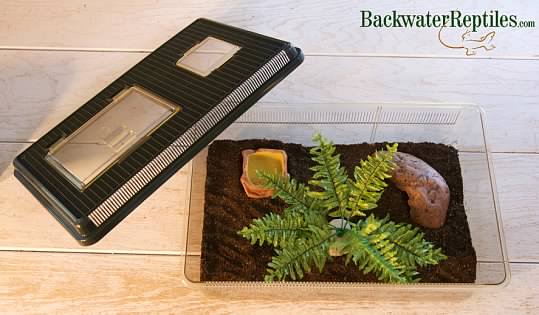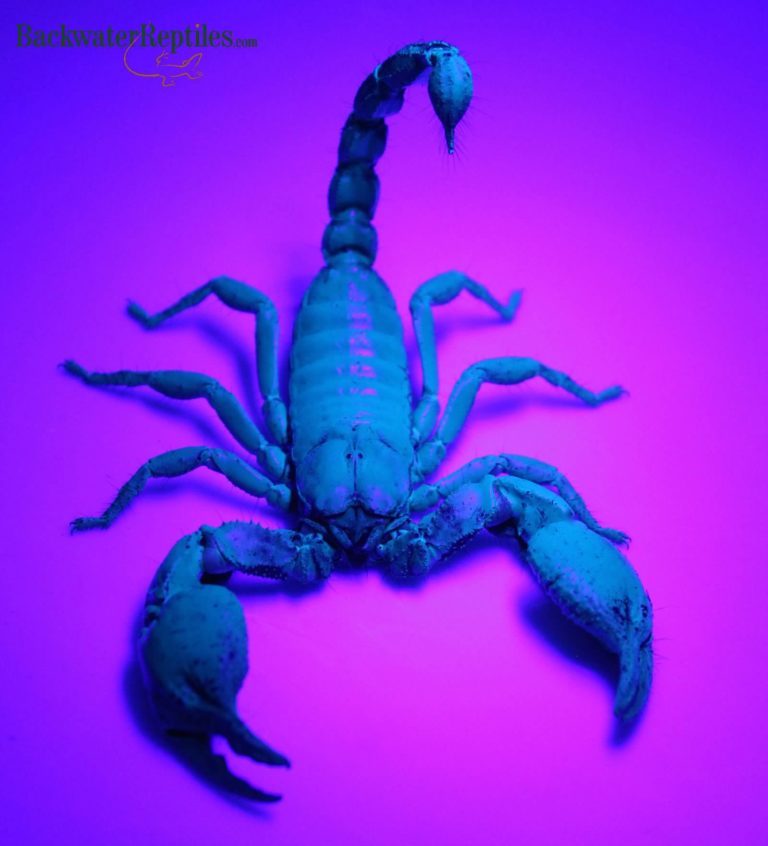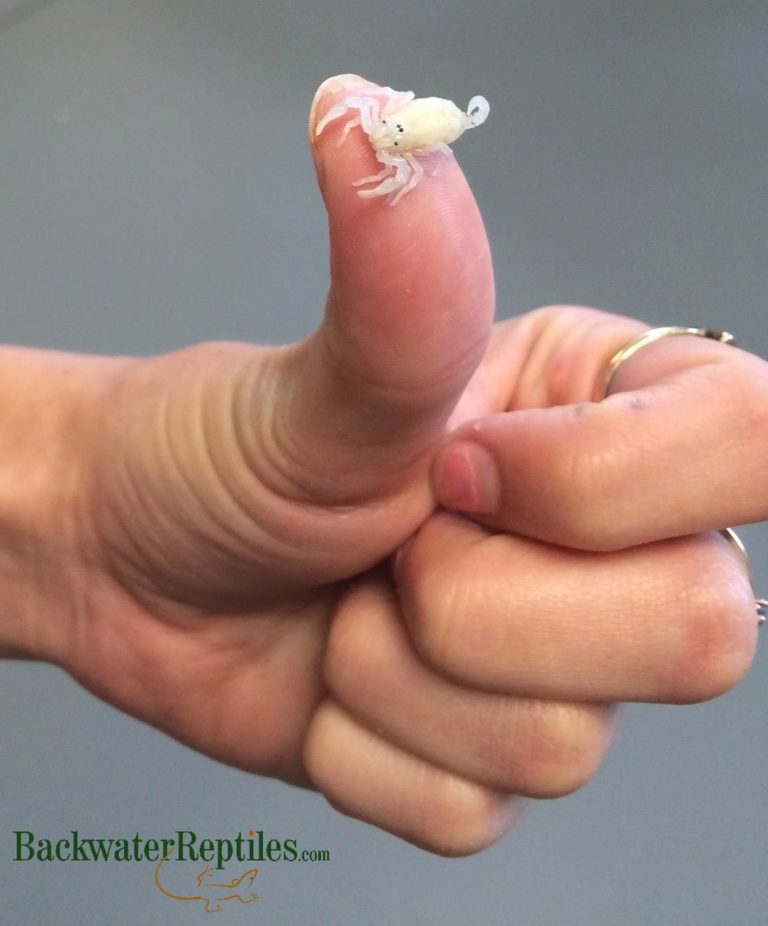What are the most popular pet scorpions?
Are you in the market for a pet scorpion but you’re unsure what species would be the best fit for you and your family? The good news is Backwater Reptiles is here to help!
We ship all kinds of scorpions all over the world to everyone ranging from people who want to keep them as personal pets to zoos and universities that place them into collections or exhibits for educational purposes.
If you are feeling a bit overwhelmed by the number of choices on the market at pet stores and breeders, then this is the blog article for you. In this article, we’ll discuss our top four most popular scorpions and how to best care for them. Luckily, no matter which scorpion you ultimately choose, they’re all really low maintenance pets with simple care requirements.
So, without further ado, we give you……
Backwater Reptiles’ most popular scorpions

Emperor Scorpion (Pandinus imperator)
Emperor Scorpions are probably our top-selling scorpion species at Backwater Reptiles. However, due to supply and demand, we do not always have them available so we often recommend their close cousins, the Dictator Scorpion or the Asian Forest Scorpion, when we run out.
This species of scorpion is one of the largest in the world and maxes out at around six to eight inches in length. They are also quite heavy-bodied with stocky, thick torsos and limbs and broad pincher claws. They are a very dark brown or black in coloration and the tips of their extremities can be a bit lighter in tone.
The average life span for such a large invertebrate species when kept in captivity is typically ten years, give or take. We advise that potential scorpion owners keep that in mind when purchasing.
Despite their large size, Emperor Scorpions actually don’t need a whole lot of space to thrive. A ten gallon tank will suffice for a full-grown adult or two, although if you plan to keep more together communally, we do recommend a bigger enclosure to prevent competition for resources and mates.
Unlike pet reptiles, scorpions do not like UV rays, therefore a UV lamp is not only not necessary, but impractical as well. On the other hand, a heat mat should be kept under the tank where it can provide a warm place for the scorpion to retire to.
Ambient cage temperatures should be in the eighties during the day with only a slight drop in temperature at night time since Emperors are a tropical species.
Although we mentioned that Emperor Scorpions do not need UV lighting, they are a species that glow under a black light. This is a really neat trick that children will love to see, so we recommend investing in a black light if you plan to make your scorpion a family or class room pet.
Make sure that your Emperor Scorpion’s tank has an appropriate substrate. This is a species that can burrow, although they do not always exhibit this behavior. They are shy creatures though, so in addition to the substrate a few hide spots are essential additions to your scorpion’s enclosure.
Like all scorpions, Emperors are carnivores. In captivity, they thrive on a diet of crickets, roaches, mealworms, and occasional wax worm treats. A single adult scorpion should be eating three to four insects per week, typically offered individually at night time when the scorpion will be most active.
One of the main reasons that Emperor Scorpions make such popular pets is that they are one of the more docile species of scorpion. They are very hesitant to sting and their venom is considered mild to those without allergies.
However, despite their “cheery” dispositions, we do recommend that the inexperienced handle scorpions with gloves and exercise extreme caution. Learn to read your scorpion’s body language when it’s being handled before exposing yourself or anyone else’s open skin to the animal.
If you are interested in purchasing your very own Emperor Scorpion, Backwater Reptiles has them for sale here.
Asian Forest Scorpion (Heterometrus longimanus)
Asian Forest Scorpions are extremely similar in appearance to Emperor Scorpions. In fact, to the inexperienced, the two are nearly indistinguishable until maturity at which point Emperors surpass Asian Forest Scorpions in terms of size.
As mentioned, Asian Forest Scorpions are very similar in appearance to Emperor Scorpions. They have very dark brown or black exoskeletons with lighter tips of their extremities. They are also stocky and thick-bodied. However, Asian Forest Scorpions rarely surpass five to six inches in length.

This species is probably one of the easiest kinds of scorpions to care for and they also breed easily in captivity. This means that you can acquire a gravid female of your own and watch her abdomen swell with babies and then care for those babies once they’re born! Or, alternatively, it is also fun to do breeding projects of your own once you are proficient in the care of the adults.
One thing that many people enjoy about Asian Forest Scorpions is their appetite. These scorpions rarely refuse a meal and certainly enjoy mealtime! Like all scorpions, they eat appropriately-sized insects.
Did you know that if you feed them well and make sure that all the scorpions are of a similar size, you can actually house Asian Forest Scorpions communally? They are semi-social and will typically get along fine provided they have enough space and are not competing for resources.
If you are interested in obtaining a pet Asian Forest Scorpion of your own, you can purchase a baby, adult, or even gravid/pregnant female from Backwater Reptiles here.
Desert Hairy Scorpion (Hadrurus arizonensis)
The Desert Hairy Scorpion is known for being the largest scorpion species native to North America. It gets its common name from the fact that it is typically found in desert climates and also because of the many sensitive hairs that adorn its exoskeleton and help it detect vibration in order to locate prey or avoid larger predatory animals.
Unlike the other scorpions on this list, the Desert Hairy has a pale yellow or straw-colored exoskeleton with dark brown to black accents on its back and head. It is also lankier and leaner than its darker-bodied brethren with thinner appendages and pinchers.
We’d like all potential Desert Hairy Scorpion owners to know that this species can actually be a bit more aggressive than the others on this list. In fact, they are typically more timid and flighty and are overall a bit more unpredictable as far as temperament is concerned.
Although this scorpion’s sting is not highly venomous, it can be painful, therefore we recommend that only those with intermediate to expert levels of experience handling scorpions and other venomous invertebrates take on a Desert Hairy Scorpion. These are best kept as a display pet, not an interactive one.
In the wild, Desert Hairy Scorpions are known for eating locusts and other smaller species of scorpion. In captivity, they will do well eating crickets and other appropriately sized insects.
Typically they should be fed a few times per week as adults and daily as babies. Aside from being fed and making sure they have a small source of water, they should require relatively little maintenance.
Desert Hairy Scorpions are aggressive towards one another and territorial. This means that unfortunately, unless you are attempting to breed, they should be housed individually. Humidity levels in their enclosure should be around 55 percent and the temperature should stay between 75 and 90 degrees Fahrenheit.
If you are ready for the responsibility, Backwater Reptiles has lovely Desert Hairy Scorpions for sale here.
Dictator Scorpion (Pandinus dictator)
The Dictator Scorpion is famous for being quite possibly the largest scorpion species on the planet! They can reach lengths of eight inches and beyond!
Dictators are very closely related to Emperor Scorpions and very much resemble them in terms of appearance. Both species are hefty-bodied with large pinchers and limbs and are sturdy and solid overall in appearance. The main difference between these two species is that Dictators surpass Emperors in terms of size.
Unfortunately, even though we have ongoing efforts to breed this species of scorpion, they are still considered a rarity in the scorpion enthusiast world. They are quite hard to come by!
So, although it’s true that many people might not own a pet Dictator Scorpion, we have included them on our most popular pet scorpions list because they sell out as quickly as we obtain them. We never manage to keep these beauties in stock for very long and we feel this makes them one of our top species.

Dictator Scorpions have very similar care requirements to Emperor Scorpions with a few exceptions. In fact, we’ve actually written an entire separate blog article dedicated to the husbandry of this rare species, which you can read here.
If you are interested in obtaining one of these lovely, large scorpions for your own collection, Backwater Reptiles does have them for sale here.
Conclusion
We hope you enjoyed reading about our most popular selection of pet scorpions. We think there is something unique, fascinating, and worthwhile about each and every scorpion species, however the ones in this article are the ones that people seem to gravitate towards.
We highly recommend doing your research and making sure that a pet scorpion is right for you and/or your family prior to purchasing. While they are striking, scorpions can live anywhere from five to ten plus years depending on the species! So, while most (if not all) species are incredibly low maintenance pets, they will stick around for quite a long time.
Just in case you want to check out how the scorpions at the Backwater Reptiles facility are kept happy and healthy, feel free to watch the video below. In it, we go into detail about what should be included in a typical scorpion cage set up.
What’s your favorite species of scorpion? Tell us in the comments!
Don’t miss our other scorpion-related articles including:
